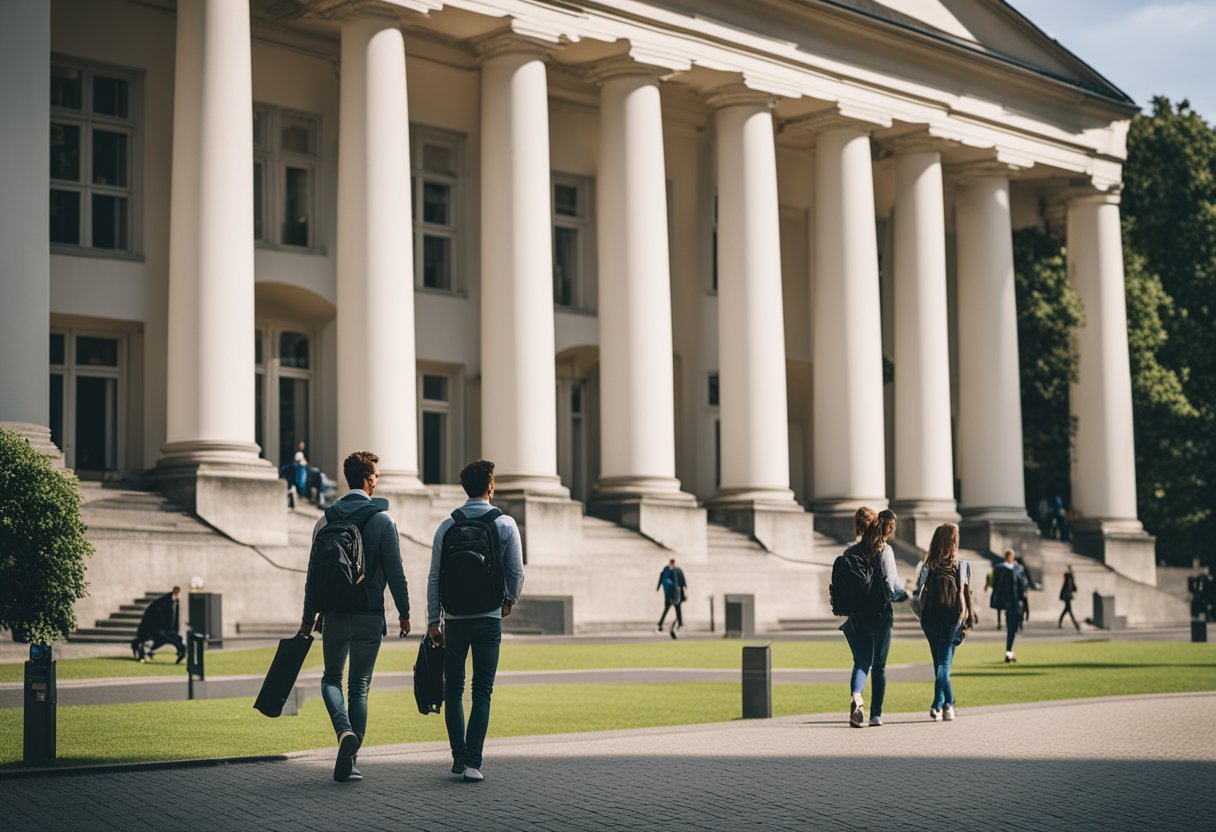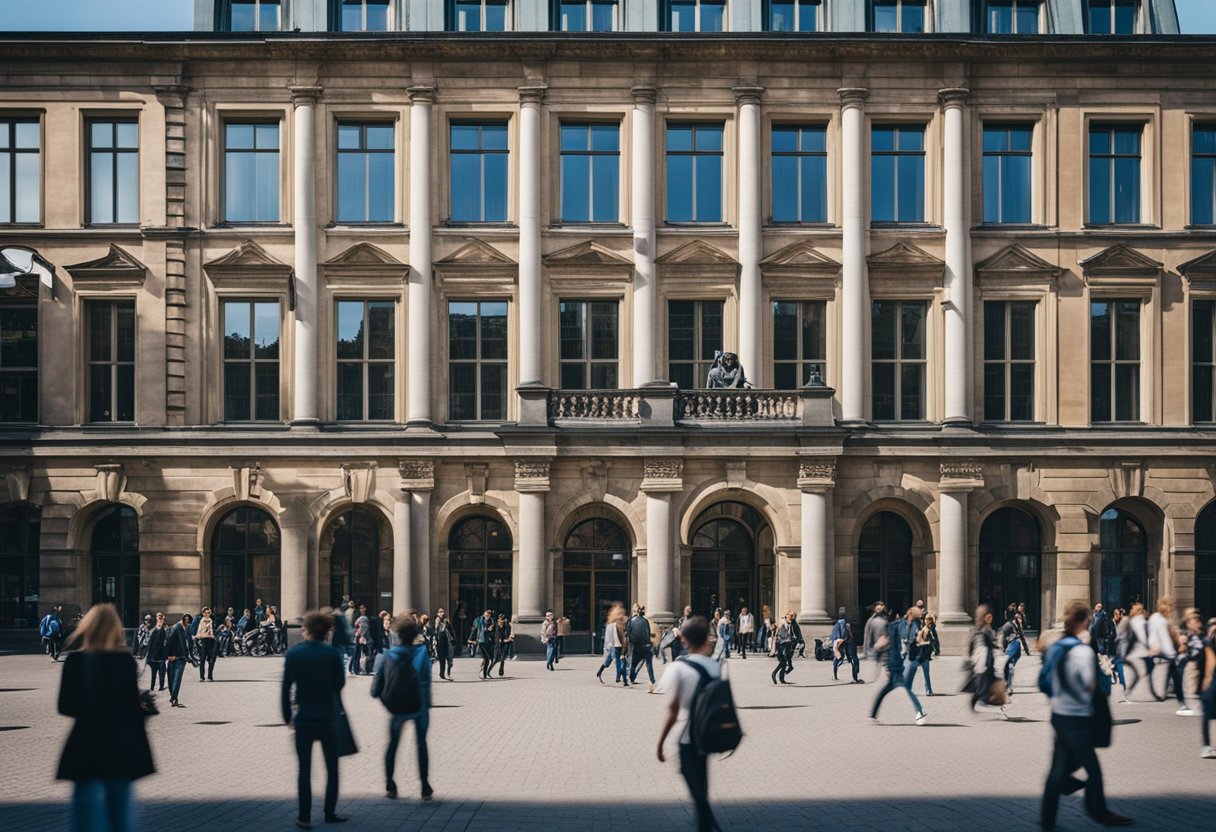If you’re thinking of studying abroad, Germany is an option you shouldn’t overlook. Rich in diverse cultures and traditions, Germany offers a unique opportunity for international students to experience its vibrant way of life. Studying in Germany provides access to some of the world’s most esteemed universities, and the country’s high-quality education system makes it an alluring destination for higher education.
As an international student in Germany, you’ll get the chance to immerse yourself in the country’s exciting festivals, observe its fascinating customs, and partake in its joyous celebrations. From Christmas markets to Carnival season, Germany offers an unparalleled study abroad experience.
Key Takeaways
- Germany provides excellent education opportunities for international students
- The country is rich in diverse cultures and traditions
- Experience the excitement of German festivals and celebrations during your study abroad journey
- Explore the unique customs and traditions associated with holidays in Germany
- Become familiar with German culture to enhance your overall studying experience in Germany
Why Choose Germany for Higher Education?
If you are considering studying abroad, then Germany is an excellent destination to consider. Pursuing higher education in Germany will give you a chance to experience a rich culture, advance your academic career, and build lasting connections with people from around the world.
Germany is home to some of the world’s best universities, such as the Technical University of Munich, and the University of Heidelberg. These universities offer a high-quality education system that combines theoretical and practical teaching methods, promoting research, innovation, and problem-solving in diverse fields. Studying in Germany will provide you the opportunity to learn in a welcoming and supportive academic environment, imparting new insights and knowledge that will boost your future career prospects.
Germany offers a vast range of study programs, including Bachelor’s, Master’s, and Doctoral degrees. There are several study fields to choose from, such as engineering, business, humanities, and natural sciences. German universities have a reputation for being innovative and flexible with teaching practices. They prioritize experimental learning, interactive teaching, and research-oriented studies, providing students with skill sets that are relevant in dynamic job markets.
International students from all around the world are drawn to Germany for their academic pursuits. Currently, over 400,000 international students study in Germany. This diversity brings a cross-cultural exchange of ideas and perspectives, promoting international understanding. Studying in Germany also offers affordable tuition fees, quality living standards, and academic excellence.
If you want to pursue higher education and immerse yourself in a new culture, Germany is an excellent choice. It offers renowned universities, high-quality education, and vast study programs. Come experience studying in Germany and discover how it can fuel your academic and personal growth.
Getting Acquainted with German Culture
Studying in Germany offers more than just academic opportunities; it’s also a chance to immerse yourself in its unique culture. To fully appreciate Germany’s traditions, it’s essential to understand its way of life, language, and customs.
For international students, the German education system might present some differences, and it’s crucial to learn about its structure, administrative procedures, and grading system, among other aspects. Student life in Germany is diverse, and it is possible to engage in many activities outside of class, such as sports, clubs, and cultural events.
One aspect that newcomers might find challenging is the language barrier, as not all Germans speak fluent English. It is highly recommended to take German language courses to improve communication, build relationships with locals, and effectively integrate into German society.
To understand the social norms and values, international students should learn about German etiquette, which values punctuality, directness, and respect for personal space. It’s also essential to have knowledge about public transportation, as most Germans rely on these networks to commute daily.
More Than Words: German Language Courses
Learning German goes beyond just speaking the language; it’s about gaining insight into German culture and building relationships with the locals. The German language courses offered at German universities are designed to improve students’ proficiency in grammar, vocabulary, and general communication skills.
Aside from classroom instruction, language courses offer opportunities for cultural exchange and language practice through tandem programs, language cafes, and language tandems with local students. Language proficiency can help international students in their academic and professional lives, as it increases employability and opens up more career opportunities.
Key German Festivals and Celebrations
If you’re studying in Germany, one of the best ways to immerse yourself in the local culture is by participating in the country’s many festivals and celebrations. From world-famous events to local customs, there’s always something exciting happening in Germany.
Oktoberfest
Without doubt, one of Germany’s most beloved festivals is Oktoberfest. Held in Munich every year, this world-famous event is a celebration of Bavarian culture and heritage. Visitors from all over the world come to enjoy traditional music, food, and, of course, beer.
Christmas Markets
Another popular tradition in Germany is the Christmas markets. These festive markets can be found in cities and towns throughout the country and are known for their cozy atmosphere, holiday decorations, and charming stalls selling traditional handicrafts and seasonal treats. If you’re studying in Germany during the winter months, be sure to experience the magic of the Christmas markets.
Karneval
For those who enjoy a party, Karneval (also known as Fasching or Fastnacht) is a festival not to be missed. This pre-Lenten celebration is characterized by lively parades, colorful costumes, and plenty of music and dancing. Karneval is celebrated in various regions of Germany, with each area putting its unique spin on the festivities.
Other Festivals
Germany is home to a wide variety of other festivals and celebrations throughout the year. From the Rhineland’s carnival season to the Berlin International Film Festival, there’s something for everyone. Check locally for unique and lesser-known festivals near your campus or in places you’d like to visit.
Christmas and New Year Celebrations in Germany
Germany is known for its picturesque Christmas markets and unique traditions. Studying in Germany during the holiday season offers a unique opportunity to experience its festive culture. From late November to Christmas Eve, the streets are lined with twinkling lights, decorated trees, and vendors selling handmade crafts and treats.
One of the highlights of the holiday season is St. Nicholas Day on December 6th. This is when children leave their shoes outside their bedroom doors, hoping that St. Nicholas will fill them with sweets and small gifts. On Christmas Eve, Germans traditionally attend midnight mass or gather with family to exchange gifts.
Silvester, or New Year’s Eve, is also an important holiday in Germany. It’s celebrated with fireworks, parties, and special food traditions. Germans eat lentil soup, which is believed to bring good luck and prosperity in the coming year. At midnight, people gather in the streets to watch spectacular fireworks displays.
Christmas Markets
Christmas markets are a unique German holiday tradition that dates back to the Middle Ages. Today, there are thousands of markets across the country, each with its own personality and charm. The markets typically feature stalls selling handmade crafts, holiday decorations, and delicious food and drinks. Some of the most popular Christmas markets are held in Berlin, Nuremberg, and Munich.
Traditional German Christmas Foods
| Food | Description |
|---|---|
| Lebkuchen | A gingerbread cookie that is popular during Christmas time. It is made with honey, spices, and almonds. |
| Stollen | A sweet loaf made with dried fruit and marzipan. It is typically eaten during Advent and Christmas. |
| Glühwein | A warm, spiced wine that is sold at Christmas markets. It is made with red wine, cinnamon, and cloves. |
As an international student studying in Germany, experiencing these unique holiday traditions is sure to be a memorable experience.
Easter Traditions in Germany
Germany is known for its colorful and joyful celebrations during Easter, which is one of the most important Christian holidays in the country. Germans celebrate Easter with various customs and traditions that have been passed down for generations. Let’s take a closer look at some of the most fascinating Easter traditions in Germany.
Easter Egg Hunts
Easter egg hunts are a popular tradition in Germany and are enjoyed by both children and adults. Eggs are painted in bright colors and hidden around the house or yard. The egg that is found first is said to bring good luck for the rest of the year.
Easter Fires
On the eve of Easter Sunday, Germans light Easter fires, which are large bonfires that symbolize the end of winter and the beginning of spring. The fires are often accompanied by music, food, and dance, and locals come together to celebrate the occasion.
Osterlamm Cake
The Osterlamm cake is a traditional Easter cake that is shaped like a lamb, representing the lamb of God. The cake is often made with a sponge cake base and decorated with icing and candy. It is a popular dessert to serve during Easter celebrations.
“Easter in Germany is a time of joyous celebration and is deeply rooted in the country’s Christian heritage.”
Overall, Easter in Germany is a time of joyous celebration and is deeply rooted in the country’s Christian heritage. From Easter egg hunts to Easter fires and Osterlamm cake, Germans have many unique and fascinating traditions to commemorate this special holiday.
Also Read: Studying in Berlin: The Capital Universities and Attractions
The Carnival Season in Germany
Germany is known for its lively celebrations and colorful parades, and the Carnival season is no exception. Karneval or Fasching, as it is sometimes called, is a pre-Lenten festival that takes place in different regions of Germany, usually between January and February. It is a time of exuberant and playful atmosphere, where people wear elaborate costumes and masks, dance in the streets, and enjoy the festive spirit.
If you are studying in Germany, experiencing the Carnival season is a must. The traditions and customs associated with this festival vary from region to region, but they all share a common thread of joy and celebration.
History of Carnival Season
The Carnival season has been celebrated in Germany for centuries and has its origins in pre-Christian traditions. It was a time when people would indulge in food, drink, and merrymaking before the solemnity of Lent. Over time, Carnival season became an opportunity to express creativity, satire, and rebellion against authority, and participants would often use masks and costumes to hide their identity.
Customs and Traditions
The Carnival season is filled with various customs and traditions, such as parades, masquerade balls, and street performances. One of the highlights of the Carnival season is the Rose Monday parade (Rosenmontagszug), a procession of floats, bands, and costumed performers that winds through the streets of many German cities and towns. Another tradition often associated with Carnival season is schnitzelbank, a humorous and satirical song sung in local dialects.
| What to Expect at Carnival Season | Where to Experience It |
|---|---|
| Elaborate costumes and masks | Cologne |
| Street performances and parades | Mainz |
| Food and drink, including local specialties | Düsseldorf |
Participating in Carnival Season
As an international student studying in Germany, Carnival season is a fantastic opportunity to experience German culture and meet new people. Many universities and student organizations offer organized events and trips to different Carnival celebrations, allowing students to fully immerse themselves in the festive atmosphere.
“The Carnival season is one of the most exciting times to be in Germany. The energy and excitement are contagious, and experiencing the parades and street performances is a truly unforgettable experience.”
Get ready to immerse yourself in the energetic and playful atmosphere of the Carnival season in Germany. With its elaborate costumes, lively parades, and festive traditions, it’s sure to be one of the highlights of your study abroad journey.
German Traditions and Customs
Aside from grand festivities and holidays, German customs significantly impact the nation’s cultural identity. International students studying in Germany gain deeper insights into German culture by understanding everyday customs and traditions. Respect for punctuality and efficiency is an integral part of German culture, so it is crucial to arrive on time for meetings and classes.
Handshakes are a common greeting in Germany and a sign of respect between people. When meeting someone for the first time, a firm handshake is appropriate. Germans have specific manners and unwritten rules for almost every situation. For instance, it is polite to hold the door open for others, but it is customary to say “Danke” (Thank you) to show gratitude.
One of the famous German customs is the Oktoberfest, a 16-day beer festival held annually in Munich, Bavaria. Visitors from all over the world gather for the event, where they experience the Bavarian way of life, drink beer, sing songs, and indulge in hearty local cuisine. Another popular tradition is the Christmas markets, where visitors can find crafts, sweets, and holiday decorations. They can enjoy mulled wine and gingerbread while enjoying the festive atmosphere.
Table manners and etiquette are essential in German culture. It is considered rude to speak with food in your mouth, place your elbows on the table, or slurp soup. Germans often toast before drinks and clink glasses to signify appreciation. Regarding dress code, Germans tend to dress conservatively and avoid athletic clothing or anything too revealing.
Furthermore, recycling is a fundamental aspect of German culture, where both private and public sectors work in harmony to achieve a sustainable environment. Germans are environmentally conscious and follow strict recycling rules. They believe that even small contributions from individuals can make a significant impact.
Overall, embracing German customs positively influences an international student’s experience in the country. By familiarizing themselves with local customs, students gain a better understanding of German culture and values and forge meaningful connections.
The Importance of Food in German Culture
One of the things that make Germany so unique is its cuisine. Whether it’s savory or sweet, German food is known for its delicious flavors and hearty portions. If you’re studying in Germany, it’s essential to indulge in the country’s culinary delights. Here are some popular dishes that you should try:
- Bratwurst: A traditional German sausage made with finely minced pork and beef.
- Pretzels: A salty snack that’s often sold by street vendors and served with mustard.
- Sauerkraut: A tangy side dish made from fermented cabbage.
- Black Forest cake: A rich, chocolate cake layered with cherries and whipped cream.
But German cuisine goes beyond just these famous dishes. Each region has its specialties and culinary traditions. Bavaria, for example, is known for its hearty meat dishes and wheat beers, while Berlin has its famous currywurst. Be sure to explore the diverse range of German food during your time studying in Germany.
The Role of Food in German Culture
But German food is more than just delicious meals – it also plays a significant role in the country’s culture. Food is a way for Germans to connect with their heritage and traditions. It’s also a way for locals to come together and celebrate important occasions, such as holidays, weddings, and other special events. German food is often prepared with care and attention to detail, reflecting the German values of hard work and discipline.
Food is also an integral part of student life in Germany. Many university cafeterias offer a variety of meal options at affordable prices, making it easy for students to grab a quick bite between classes. In addition, there are numerous food markets and street vendors where you can try different food specialties from around the world.
The Future of German Cuisine
As Germany becomes increasingly multicultural, its cuisine is also evolving. Today, it’s not uncommon to find fusion food, blending traditional German recipes with flavors from other cultures. In this way, food has become a way to celebrate diversity and connect with other cultures. It’s an exciting time for German cuisine, and as a student studying in Germany, you’re in the perfect position to be a part of this cultural transformation.
Exploring German Music, Art, and Literature
Germany boasts of a rich artistic and literary heritage that has influenced world culture. From classical composers Beethoven and Bach to contemporary artists, German music has evolved over centuries with a range of styles, including rock, pop, electronic, and alternative forms.
Famous German authors, poets, and playwrights have also made an indelible mark in literature history with their works. Johann Wolfgang von Goethe, Friedrich Schiller, Heinrich Heine, and Thomas Mann are some names that come to mind.
Artistically, Germany has always been at the forefront with artistic movements like Bauhaus and Expressionism. The country has produced artists like Albrecht Dzurer, Caspar David Friedrich, and Gerhard Richter.
International students can explore the artistic and literary world through museums, theaters, and cultural institutions during their time in Germany. Immerse yourself in the history and culture of German art, literature, and music, and gain unique insights into their evolving artistic traditions.
“Music is the divine way to tell beautiful, poetic things to the heart.” – Pablo Casals
Gallery of Famous German Artists
| Artist | Art Style | Notable Works |
|---|---|---|
| Albrecht Dzurer | Renaissance | Self-Portrait at the Age of 28, Four Horsemen of the Apocalypse |
| Caspar David Friedrich | Romanticism | Wanderer above the Sea of Fog, The Abbey in the Oakwood |
| Gerhard Richter | Contemporary | Abstraktes Bild, Betty |
Famous German Composers
- Johann Sebastian Bach
- Ludwig van Beethoven
- Johannes Brahms
- Richard Wagner
- Georg Friedrich Händel
Famous German Writers
- Johann Wolfgang von Goethe
- Friedrich Schiller
- Heinrich Heine
- Thomas Mann
- Franz Kafka
Embracing German Traditions: Tips for International Students
Studying in Germany offers a unique opportunity to immerse yourself in the country’s rich traditions, festivals, holidays, and customs. To make the most out of your time studying in this vibrant country, it’s essential to embrace German culture. Here are some practical tips for international students:
Learn the Language
One of the best ways to immerse yourself in German culture is by learning the language. Take advantage of language courses offered by your university or attend local language schools. Communicating with locals in their native language will help you build connections and integrate into German society and Cost of Living in Germany for International Students.
Engage in Cultural Exchange
Participate in cultural exchange programs and events offered by your university or local organizations. This will allow you to connect with locals and gain a deeper understanding of German customs and traditions.
Attend Festivals and Celebrations
Attend local festivals and celebrations to experience the vibrant atmosphere of German culture. From the world-famous Oktoberfest to smaller regional festivals, there is always something to celebrate in Germany. Don’t be afraid to try traditional foods, dress up in costumes, and join in on the festivities.
Join Clubs and Organizations
Join clubs and organizations that align with your interests. This is a great way to meet new people, make friends, and engage in extracurricular activities. Look for clubs that share your passion for music, sports, or cultural activities.
Explore German History and Culture
Explore Germany’s rich history and cultural heritage through visits to museums, theaters, and historical sites. This will deepen your understanding of German culture and provide you with a greater appreciation for its customs and traditions.
“Embracing German culture is an essential part of the study-abroad experience for international students. It allows us to gain a deeper appreciation for our host country and build connections with locals.”– Maria, International Student in Germany
Conclusion
Studying in Germany is an excellent opportunity to experience its vibrant culture through festivals, holidays, and customs. The country’s renowned universities, high-quality education system, and vast range of study programs make it an ideal destination for international students.
By familiarizing yourself with German culture, you can enhance your overall studying experience in Germany. Explore the festivities and traditions associated with Christmas, Easter, and the Carnival season. Indulge in the flavors of German cuisine and immerse yourself in the world of German music, art, and literature.
As an international student in Germany, embracing local traditions can help you build connections with locals and make the most of your study abroad journey. With practical tips on how to adapt to German culture and language learning, you can thrive in this vibrant country.
So what are you waiting for? Start preparing for your journey to Germany, experience its rich traditions, and create unforgettable memories that will last a lifetime. Begin your study abroad journey today and discover the exciting student life in Germany.





